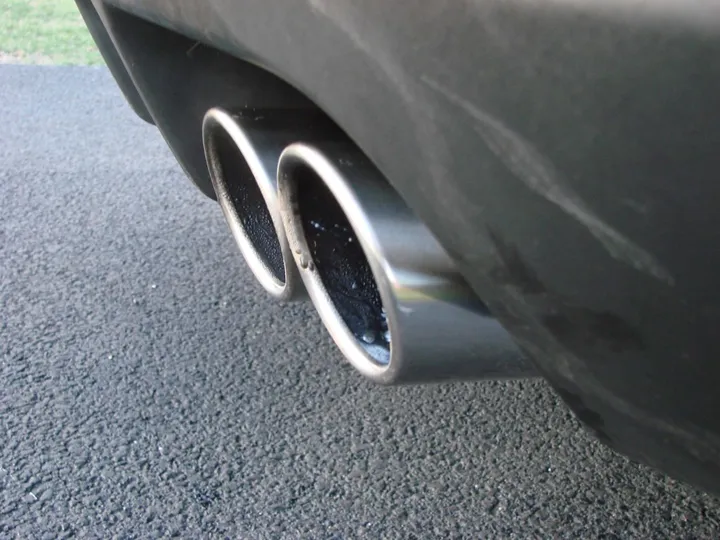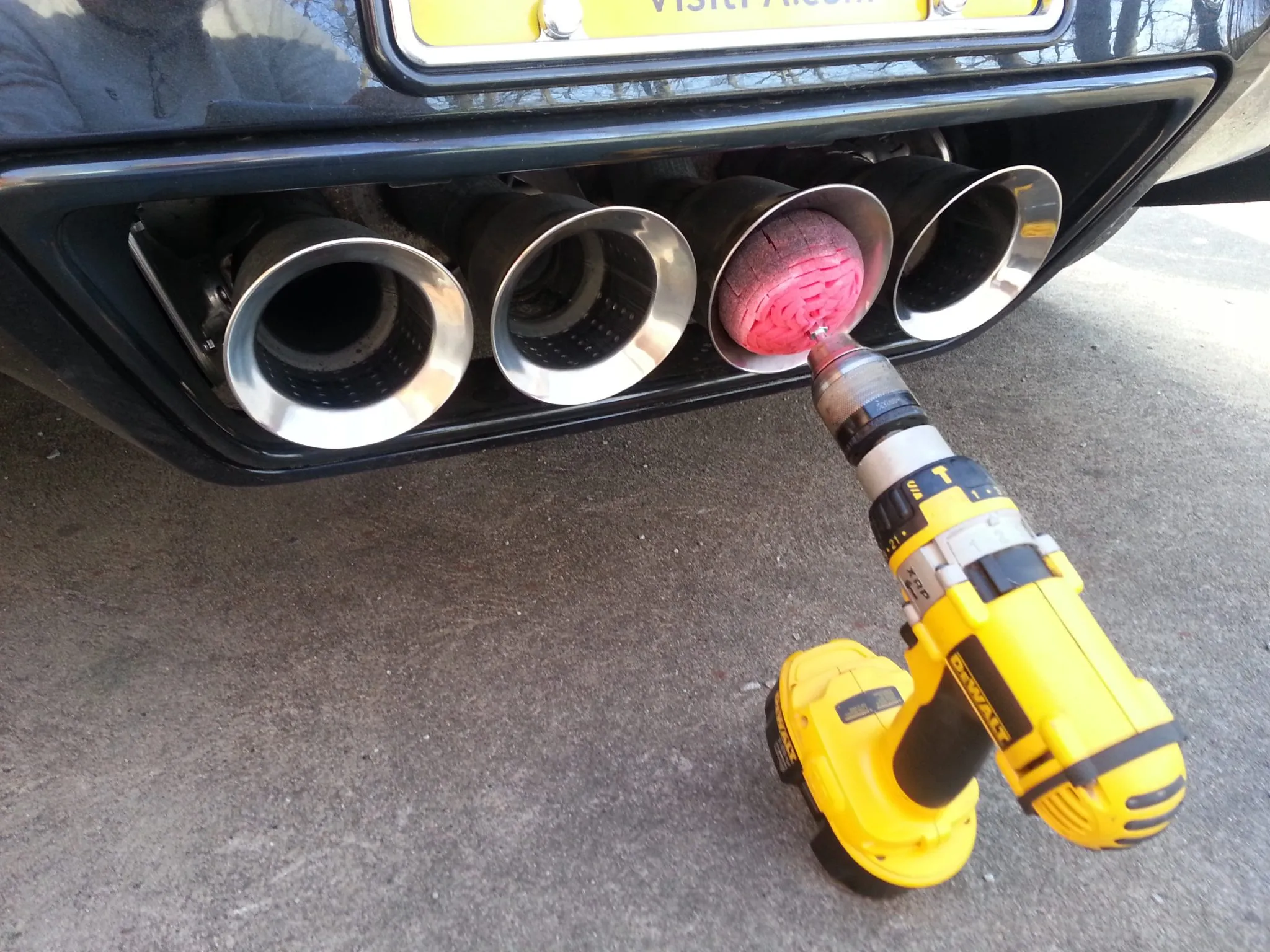


Black exhaust tips are a popular aesthetic feature on many modern vehicles, particularly high-performance and luxury models. However, over time, these tips can accumulate unsightly carbon buildup and soot, dulling their appearance. Proper cleaning and maintenance are essential to keep your black exhaust tips looking their best.

Before we dive into the cleaning process, it's crucial to understand the root cause of those pesky black deposits. Carbon buildup is a natural byproduct of the combustion process in gasoline engines. As fuel burns, tiny unburnt particles can escape through the exhaust system and accumulate on the exhaust tips over time, creating a sooty, black appearance.
However, excessive carbon buildup can be a symptom of other underlying issues. Let's explore the main causes:
| Cause | Explanation |
|---|---|
| Direct Injection Engines | These modern engines tend to produce more carbon deposits compared to traditional port injection systems due to differences in fuel delivery methods. The fuel is injected directly into the combustion chamber, leading to a higher likelihood of unburnt particles escaping through the exhaust. |
| Rich Air/Fuel Mixture | If your engine is running too rich (too much fuel and not enough air), it can lead to incomplete combustion and increased carbon deposits. This can be caused by faulty sensors, clogged air filters, or other issues affecting the air/fuel ratio. |
| Clogged Air Filters | A clogged air filter restricts airflow, causing the engine to run rich and produce more carbon buildup. |
| Faulty Fuel Injectors | Malfunctioning fuel injectors can also contribute to an improper air/fuel mixture and increased carbon deposits. If the injectors are not delivering the correct amount of fuel or if the spray pattern is off, it can lead to incomplete combustion. |
Before you start cleaning, it's crucial to inspect your exhaust tips and identify the extent of the problem. Here's how you can do it:
Visual Inspection: Take a close look at the exhaust tips and check for black soot buildup around the edges and inside the tips. Pay attention to the thickness and distribution of the deposits.
Touch Test: Run your finger along the inside of the exhaust tip. If you feel excessive black residue, it's a clear indication of rich running conditions.
Smoke Check: While driving, keep an eye out for black smoke coming from the exhaust. This could indicate other issues like burning oil, which may require further investigation.
Once you've identified the cause of the carbon buildup, it's time to take action. Here are some repair instructions for specific causes:
For regular carbon buildup, you'll need a polish or cleaner designed specifically for exhaust tips, such as P21S Polishing Soap or Bar Keeper's Friend. Use a sponge or 0000 steel wool to gently scrub off the deposits.
| Product | Description |
|---|---|
| P21S Polishing Soap | A specialized cleaner designed for exhaust tips and other metal surfaces. It effectively removes carbon buildup while leaving a protective coating. |
| Bar Keeper's Friend | A versatile cleaning product that can be used on exhaust tips. It contains oxalic acid, which helps break down carbon deposits. |
Replace the clogged air filters with new ones to restore proper airflow and prevent excessive carbon buildup. Refer to your vehicle's owner's manual for the correct replacement procedure and filter specifications.
If your fuel injectors are malfunctioning, you may need to replace them to ensure proper fuel delivery and combustion. This can be a more complex and costly repair, so it's best to have a professional mechanic handle it.
To help remove internal carbon deposits, consider using a fuel system cleaner like Seafoam. These cleaners can help dissolve and remove buildup from the combustion chambers and exhaust system.
Add the recommended amount of fuel system cleaner to your gas tank and fill up with fresh gasoline.
Drive the vehicle for several miles to allow the cleaner to circulate through the fuel system and combustion chambers.
The cleaner will help break down and remove carbon deposits, which may be expelled through the exhaust.
While cleaning the exhaust tips is essential, preventing future buildup is equally important. Here are some tips to help keep your exhaust tips looking pristine:

Regular Cleaning: Make it a habit to clean your exhaust tips after every wash or at least once a month. Consistent maintenance will prevent excessive buildup.
Use Top-Tier Gasoline: Top-tier gasoline contains detergent additives that can help reduce carbon deposits in your engine and exhaust system.
Avoid Excessive Idling: Excessive idling or short trips can prevent your engine from reaching optimal temperatures, leading to incomplete combustion and increased carbon buildup.
Consider Ceramic or Powder Coating: Ceramic or powder coating your exhaust tips can make them easier to maintain and less prone to staining.
If you prefer to tackle the cleaning process yourself, the costs are relatively low. Products like P21S Polishing Soap or steel wool can cost between $10 and $15. However, if you'd rather leave it to the professionals, detailing services may charge $50 to $100 for exhaust tip cleaning and polishing.
In case you need to replace clogged air filters or faulty fuel injectors, the costs can vary. Air filters typically range from $10 to $30, while fuel injectors can cost anywhere from $200 to $500 per injector, depending on your vehicle's make and model.
If you opt for powder coating your exhaust tips, expect to pay between $50 and $100 for the service.
Cleaning black exhaust tips may seem like a daunting task, but with the right knowledge and tools, it's a straightforward process. By understanding the causes of carbon buildup, inspecting your vehicle, and following the appropriate repair instructions, you can restore your exhaust tips to their former shine.
Remember, regular maintenance and preventive measures are key to keeping your exhaust tips looking their best. So, don't let those unsightly black stains dampen your ride's appearance – take action and enjoy the satisfaction of a well-maintained vehicle.
Carbon buildup is a natural byproduct of the combustion process in gasoline engines. Unburnt fuel particles escape through the exhaust system and accumulate on the exhaust tips over time.
Yes, excessive carbon buildup can be a symptom of underlying problems like a rich air/fuel mixture, clogged air filters, or faulty fuel injectors.
Perform a visual inspection of the exhaust tips, touch the inside of the tips for residue, and check for black smoke coming from the exhaust while driving.
P21S Polishing Soap and Bar Keeper's Friend are effective products for cleaning exhaust tips and removing carbon buildup.
Replace the clogged air filters with new ones according to your vehicle's owner's manual specifications.
Faulty fuel injectors may need to be replaced by a professional mechanic to ensure proper fuel delivery and combustion.
Yes, fuel system cleaners like Seafoam can help dissolve and remove carbon buildup from the combustion chambers and exhaust system.
Use top-tier gasoline, avoid excessive idling, clean exhaust tips regularly, and consider ceramic or powder coating for easier maintenance.
Detailing services may charge $50 to $100 for exhaust tip cleaning and polishing.
Air filters typically cost $10 to $30, while fuel injectors can range from $200 to $500 per injector, depending on the vehicle.

Sarah isn't your average gearhead. With a double major in Mechanical Engineering and Automotive Technology, she dived straight into the world of car repair. After 15 years of turning wrenches at dealerships and independent shops, Sarah joined MICDOT to share her expertise and passion for making cars run like new. Her in-depth knowledge and knack for explaining complex issues in simple terms make her a valuable asset to our team.









